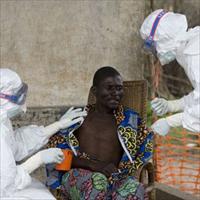UGANDA-DRC: Ebola under control but experts fear re-emergence in Congo

Ugandan health officials said they had an outbreak of a rare Ebola strain under control in their country but expressed concerns that the disease could resurface in the neighbouring Democratic Republic of Congo (DRC).
At a news conference in the capital Kampala on 18 December, the Ministry of Health said a person "with the appropriate clinical case definition of Ebola" had been identified in an area in DRC near the border.
They said Uganda had contacted the UN World Health Organization (WHO) over the current threat.
"We have asked our people in Bundibugyo [the epicentre of the latest outbreak in Uganda] to encourage them to come over for treatment because these diseases know no boundaries," Emmanuel Otaala, the minister in charge of primary health care, said. "We are in touch with Kinshasa [DRC’s capital] through the World Health Organization and we have also contacted our foreign ministry to handle it through the diplomatic channels."
Some 127 cases of suspected Ebola have been reported in Uganda, 35 of whom have died, including five health workers. Another 39 patients, including six health workers, have been discharged from hospital after making a full recovery.
Otaala said there had been a general decline in the number of new Ebola cases, with only three cases reported in the past four days - an indication that the outbreak was now under control.
Tests on other suspected cases reported outside Bundibugyo district were negative, while the capacity of all referral hospitals to handle contagious infections had been improved, he said.
Health official Sam Okware told IRIN a taskforce set up to fight the outbreak has been tasked with convincing the public in the affected region to abandon traditional circumcision rituals, due to start shortly, until the epidemic clears.
He also said that those people discharged from hospital had been asked to abstain from sex for three months or use condoms as the virus could be carried in semen.
Virologists are investigating what triggered the latest epidemic and are specifically exploring reports that it could have started when a family of 10 people feasted on a dead goat that had been bitten by a wild animal. The 10 later fell sick.
"We have tried to look for the skin of the goat but it is not there and we are suspecting that these people might have eaten the real wild animal, but we have not made any conclusions yet," Okware said.
An outbreak of the highly contagious disease, which can have fatality rates as high as 90 percent, killed at least 170 people in northern Uganda in 2000.
A similar Ebola outbreak killed at least 26 people in DRC’s West Kasai region, in a country where the disease was first discovered in 1976.
 Back and Next - Back and Next
Back and Next - Back and Next See Also - See Also
See Also - See Also